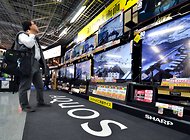But the ban is unlikely to have an immediate impact on sales of those devices in the United States.
The United States International Trade Commission said on Tuesday that it was issuing a ban for a handful of devices that work on ATT’s network, including the third- and fourth-generation iPhone, and the first-, second- and third-generation iPads that have a cellular connection.
President Obama has 60 days to review the order and can veto it.
Apple said it intended to appeal the decision, so it will be some time until the commission’s decision goes into effect, if at all.
“We are disappointed that the commission has overturned an earlier ruling and we plan to appeal,” said Steve Dowling, an Apple spokesman. “Today’s decision has no impact on the availability of Apple products in the United States.”
The ban already faces challenges because of executive orders issued by Mr. Obama on Tuesday to tighten regulations at the Patent and Trademark Office. One order, labeled “Strengthen Enforcement Process of Exclusion Orders,” called for a strict review of the procedures that the commission uses to enforce exclusion orders.
The order noted that enforcement of a ban would be difficult when the ban involves “a technologically sophisticated product such as a smartphone” because customs officials would have trouble telling the difference between a redesigned product, which would not be banned, and an older model that has been banned.
Samsung, which in August lost the patent case and was told to pay Apple more than $599 million in damages, endorsed the commission’s ruling.
“We believe the I.T.C.’s final determination has confirmed Apple’s history of free-riding on Samsung’s technological innovations,” Samsung said in a statement.
Carolina Milanesi, vice president of Gartner Research, who tracks the smartphone industry, said that even if the ban went through, it would not have a huge impact on Apple. She said the majority of iPhones sold today are the iPhone 4S and iPhone 5 models, which are not included in the ban. When the next iPhone comes out, the iPhone 4 model will be even less relevant to Apple’s bottom line, she said.
“It has more to do with counting the blows between the two parties, and this is one for Samsung, but materially there is not going to be a huge impact,” Ms. Milanesi said.
Mr. Dowling said Samsung’s actions had not held up in courts outside the United States. He added: “Samsung is using a strategy which has been rejected by courts and regulators around the world.”

Article source: http://www.nytimes.com/2013/06/05/technology/apple-violates-samsung-patent-us-trade-panel-says.html?partner=rss&emc=rss
